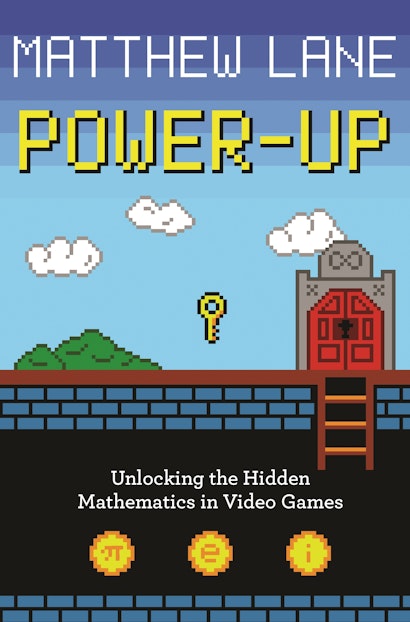Did you know that every time you pick up the controller to your PlayStation or Xbox, you are entering a game world steeped in mathematics? Power-Up reveals the hidden mathematics in many of today’s most popular video games and explains why mathematical learning doesn’t just happen in the classroom or from books—you’re doing it without even realizing it when you play games on your cell phone.
In this lively and entertaining book, Matthew Lane discusses how gamers are engaging with the traveling salesman problem when they play Assassin’s Creed, why it is mathematically impossible for Mario to jump through the Mushroom Kingdom in Super Mario Bros., and how The Sims teaches us the mathematical costs of maintaining relationships. He looks at mathematical pursuit problems in classic games like Missile Command and Ms. Pac-Man, and how each time you play Tetris, you’re grappling with one of the most famous unsolved problems in all of mathematics and computer science. Along the way, Lane discusses why Family Feud and Pictionary make for ho-hum video games, how realism in video games (or the lack of it) influences learning, what video games can teach us about the mathematics of voting, the mathematics of designing video games, and much more.
Power-Up shows how the world of video games is an unexpectedly rich medium for learning about the beautiful mathematical ideas that touch all aspects of our lives—including our virtual ones.
Matthew Lane is a mathematician and cofounder of Rithm, a school for aspiring web developers. He is also the creator of Math Goes Pop!, a blog that explores the interconnections between mathematics and popular culture. He lives in San Francisco.
"Lane explores secondary, or hidden, mathematical gems that a player might discover upon mature reflection. . . . Just as most car drivers prefer not to inquire how the internal combustion engine works, most video-type users prefer not to ask how computer magic works. For the few who do ask questions, Lane assures us and as his book testifies, 'there's a lot of mathematics under the surface'."—Andrew James Simoson, MathSciNet
"Lane explains some pretty technical concepts in an accessible way. . . . A fun survey of interesting maths related through the lens of video games."—Paul Taylor, Aperiodical
"The examples [in Power-Up] were carefully chosen from very popular games, so even the most casual player will have heard of the vast majority of the games discussed. In general, Lane's writing is easy to digest, and the use of color and high-quality paper gives the book a nice look and feel."—Choice
"PowerUp is a very readable book based on examples taken from popular video games. . . . It is a pity that too many people are deprived of the pleasure of finding things out via the intellectual game of mathematics. Hopefully, the effort of the likes of Matthew Lane will someday solve the severe marketing problem of mathematics."—Computing Reviews
"Overall the book is excellent. Lane has written a high readable text with colorful illustrations. You won’t regret reading it and maybe Power-Up will add a new level of insight to your computer gaming."—MAA Reviews
"Matthew Lane explores the mathematical underpinning many popular video games in this well-written and very enjoyable book that is pitched at a very broad audience"—Dominic Thorrington, Mathematics Today
"Are you a video game enthusiast who is getting tired of being asked ‘How can you waste time on such stuff?' This book is your answer! Matthew Lane skillfully weaves a tale of how video games can be important tools for teaching mathematics and physics. As a long-time video gamer, I highly recommend Power-Up."—Paul J. Nahin, author of In Praise of Simple Physics
"What a delightful journey through the math of hidden worlds! This is much more than a book about video games. It's an exploration of interconnectedness and an invitation for the perpetually curious."—Karim Ani, founder of Mathalicious
"After reading Power-Up, parents, teachers, and nongamers who have eschewed letting young people play video games may see that games are not the ‘evil distraction' they have been made out to be."—Robin Angotti, University of Washington


